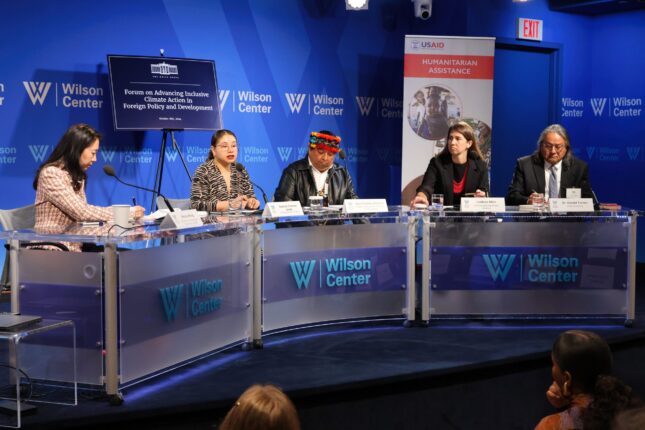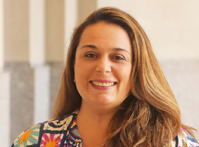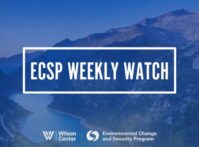-
The Arc | Indigenous and Community Power: Localizing Climate Action
November 15, 2024 By Wilson Center Staff In today’s episode of The Arc, we are featuring a panel discussion on climate action through Indigenous and community power from the Forum on Advancing Inclusive Climate Action in Foreign Policy and Development, hosted by the Wilson Center in collaboration with the White House and USAID’s Bureau for Humanitarian Assistance, with support from the USAID Climate Adaptation Support Activity.
In today’s episode of The Arc, we are featuring a panel discussion on climate action through Indigenous and community power from the Forum on Advancing Inclusive Climate Action in Foreign Policy and Development, hosted by the Wilson Center in collaboration with the White House and USAID’s Bureau for Humanitarian Assistance, with support from the USAID Climate Adaptation Support Activity.In today’s episode of The Arc, we are featuring a panel discussion on climate action through Indigenous and community power from the Forum on Advancing Inclusive Climate Action in Foreign Policy and Development, hosted by the Wilson Center in collaboration with the White House and USAID’s Bureau for Humanitarian Assistance, with support from the USAID Climate Adaptation Support Activity.
You will hear from the panel’s moderator, Marcia Wong, Deputy Assistant to the Administrator, Bureau for Humanitarian Assistance, US Agency for International Development, and from expert panelists, Desirée Cormier Smith, Special Representative for Racial Equity and Justice, US Department of State; Juan Carlos Jintiach, Executive Secretary, Global Alliance of Territorial Communities; Lindsey Allen, the Executive Director of the Climate and Land Use Alliance; and Dr. Gerald Torres, Professor of Environmental Justice, Yale School of the Environment and Yale Law School. Select quotes are featured below:
On the links between Indigenous peoples’ knowledge and climate action
Marcia Wong: Indigenous people manage over 25 percent of the world’s land surface, which intersects with 40 percent of all terrestrial protected areas and ecologically intact landscapes. So, it shouldn’t come as any surprise then that they possess deep rooted knowledge about the environment and offer climate solutions centered around traditional practices that emphasizes local knowledge and the balance between humans and the natural world, an approach that sustains ecosystems for generations.
Desirée Cormier Smith: It is primarily disproportionately black and Indigenous communities who are on the frontlines of climate change and climate injustice, and who bear the biggest brunt of these challenges. Yet they are often left out of the rooms where the decisions are being made about their own land, their own future. This is particularly true for Indigenous peoples around the world where far too often, they’re told what they need to do instead of actually being consulted.
Juan Carlos Jintiach: Many of my brothers and sisters on the planet, not only the tropics, we have the knowledge, beautiful, ancient knowledge, and are working to protect their communities on the frontlines of climate change. We are part of nature. We are connected. We are one. We cannot be separated.
Lindsey Allen: Once we understand that forests are a critical part of the solution, then the question is, who has been advancing that solution? And what we know is where we see tropical forests that are still standing, we see communities that again have been ensuring the protection of those forests with their lives.
And so I actually just came from the Brazilian Amazon, and one of the things that one of our partners was saying is this is not a place that’s been devoid of people. We should think about the Amazon Basin as one of the greatest technological achievements of Indigenous peoples because they have lived In relationship with us, they have cultivated food security. They have maintained clean water. They have maintained local livelihoods for generations. And so, essentially, what is needed is to reduce the amount of threats on their ability to do that stewardship and engage them in the solutions.
Dr. Gerald Torres: Preserving and protecting Indigenous knowledge is the critical thing. We need to recognize that the people who bring you that knowledge have long been the possessors of it. And that it’s not something that can be commodified as such, but needs to be integrated into the way we think about climate change.
We need to create a space where that knowledge can be both respected in the way in which conventional Western scientific knowledge is respected first of all as adding an important and real and concrete additional insight and analytic technique, and to protect the possessors of it.
On engaging local and Indigenous governance structures and climate action
Juan Carlos Jintiach: We have United Nations Indigenous Peoples Rights. We have other treaties. Sometimes governments speak very beautifully in the international context, but when they go back home, they don’t receive us in their office. We don’t know which minister we need to engage with sometimes. I have many stories about it, very sad stories.
This dynamic has to change because we are already very well organized. We are working together in unity. The elders, they communicate in the communities and help us elect leaders. We are learning and sharing experiences between my people and those in the Amazon Basin, and we need to recognize our own governance.
We talk, we hold, we manage the land, we eat from the land. We have something to inspire, to contribute to the world.
Lindsey Allen: So we are a big advocate and we’re actively supporting and encouraging other donors to support direct investments into the Indigenous and afro descendant led territorial funds.
Because we understand that there is a risk of philanthropy continuing to hold too much power in what decisions are being made. And so this is the parallel to the kind of government risk of directing what needs to happen. There’s that risk for philanthropy as well. So there are now territorial funds.
In a number of these territories, the funds are controlled and they are accountable to the existing governance structures of Indigenous or local or afro descendant communities and they are now positioned to receive resources.
Photo credit: Wilson Center Staff
 A Publication of the Stimson Center.
A Publication of the Stimson Center.

 In today’s episode of The Arc, we are featuring a panel discussion on climate action through Indigenous and community power from the Forum on Advancing Inclusive Climate Action in Foreign Policy and Development, hosted by the Wilson Center in collaboration with the White House and USAID’s Bureau for Humanitarian Assistance, with support from the USAID Climate Adaptation Support Activity.
In today’s episode of The Arc, we are featuring a panel discussion on climate action through Indigenous and community power from the Forum on Advancing Inclusive Climate Action in Foreign Policy and Development, hosted by the Wilson Center in collaboration with the White House and USAID’s Bureau for Humanitarian Assistance, with support from the USAID Climate Adaptation Support Activity.






